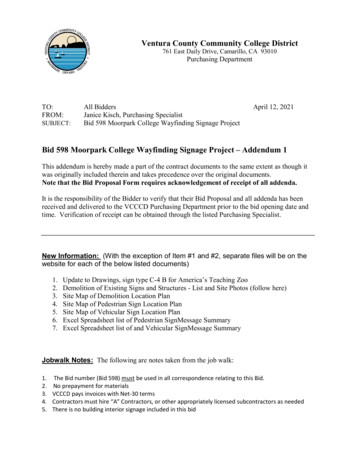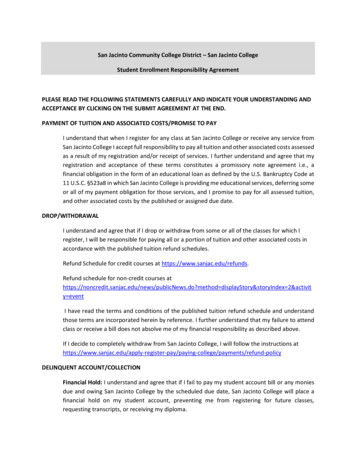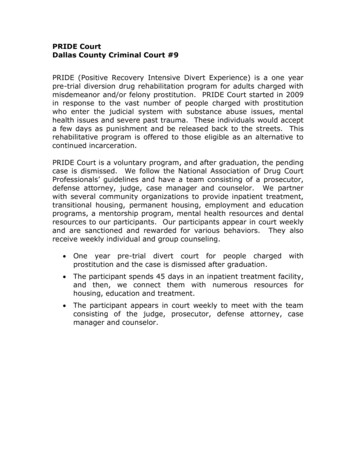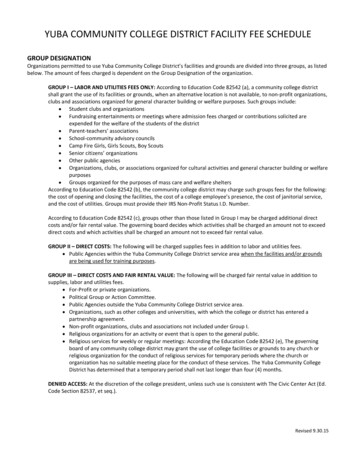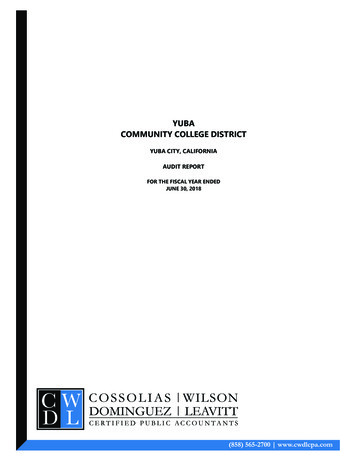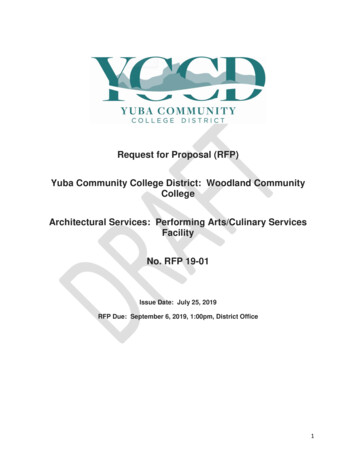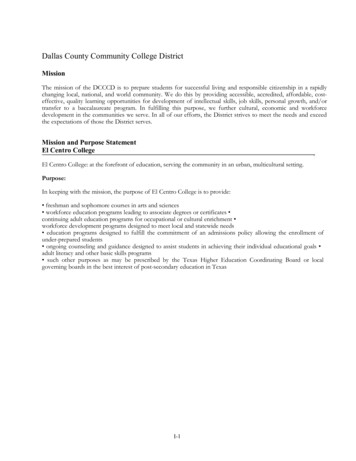
Transcription
Dallas County Community College DistrictMissionThe mission of the DCCCD is to prepare students for successful living and responsible citizenship in a rapidlychanging local, national, and world community. We do this by providing accessible, accredited, affordable, costeffective, quality learning opportunities for development of intellectual skills, job skills, personal growth, and/ortransfer to a baccalaureate program. In fulfilling this purpose, we further cultural, economic and workforcedevelopment in the communities we serve. In all of our efforts, the District strives to meet the needs and exceedthe expectations of those the District serves.Mission and Purpose StatementEl Centro CollegeEl Centro College: at the forefront of education, serving the community in an urban, multicultural setting.Purpose:In keeping with the mission, the purpose of El Centro College is to provide: freshman and sophomore courses in arts and sciences workforce education programs leading to associate degrees or certificates continuing adult education programs for occupational or cultural enrichment workforce development programs designed to meet local and statewide needs education programs designed to fulfill the commitment of an admissions policy allowing the enrollment ofunder-prepared students ongoing counseling and guidance designed to assist students in achieving their individual educational goals adult literacy and other basic skills programs such other purposes as may be prescribed by the Texas Higher Education Coordinating Board or localgoverning boards in the best interest of post-secondary education in TexasI 1
History of the El Centro College AssociateDegree Nursing ProgramEl Centro College is the flagship college of the Dallas County Community College District (DCCCD) and islocated in the heart of downtown Dallas. It is an accredited, comprehensive, public, two-year communitycollege that has been in operation since September 1966. The DCCCD is comprised of seven colleges, aswell as the Institute for Economic Development, and the Center for Educational Telecommunication. Allsegments are teaching/learning and community-building institutions.Time Line of the El Centro Nursing Program: September 1, 1966 the nursing program began with an enrollment of 26 students and four faculty. 1975, a satellite campus was initiated at Navarro College in Corsicana, Texas. Thirty-two studentsenrolled in the first class. 1976, the National League for Nursing granted the initial eight-year accreditation to the nursingprogram. Continued accreditation status has been maintained since that time. 1982, Navarro College received approval from the Board of Nurse Examiners to open its ownnursing program and the satellite agreement with Navarro College was terminated. 1982, in response to the rapid growth of Dallas County and as a cost-effective means ofaddressing a severe community nursing shortage, a second nursing satellite program wasestablished at Brookhaven College, in Farmers Branch, Texas. 1988, the nursing program at El Centro College adopted an advanced placement curriculum planavailable for licensed vocational nurses (LVNs) that desired to Bridge from LVN to RN. 1992, due to the high volume of nursing and allied health students the Health OccupationsAdmissions Office was created as a separate entity for processing applicants for the nursing andallied health programs. 2002, to help meet the student’s clinical needs an innovated approach was introduced usingPreceptors. This allowed faculty to help students develop increased clinical skills. Spring 2003, El Centro’s Nursing Fast Track Option was introduced, which allowed the studentto complete the nursing courses within seventeen months instead of the regular twenty-fourmonths. The first class had twenty students. Fall 2003, a satellite program was established with Texas Health Resources to offer theory via livebroadcast to selected students at Presbyterian Hospital in Dallas and Harris Methodist Hospitalin Fort Worth. The first class started with twenty students. Currently, forty students are admittedeach semester. Spring 2004, on-line offerings were established for selected El Centro nursing classes. The firstclass had one hundred and thirty students. Satellite programs were established at Methodist DallasMedical Center and Baylor University Medical Center. Fall 2004, a nursing satellite program was initiated with North Lake College in Irving. The firstclass started with fifty students. The satellite site at Brookhaven College was terminated due toBrookhaven’s application to the Texas Board of Nurse Examiners for its own nursing program. Fall 2007, anticipated move of Allied Health and Nursing into the Paramont Building.I 2
Currently, the El Centro Associate Degree Nursing Program is one of the largest in the nation. The ElCentro Nursing Program has a widely diverse ethnic population consisting of more than 550 students withover 30 full time faculty, 8 adjunct faculty and 12 loan faculty from THR, Baylor and Methodist. Today, ElCentro’s graduating nursing class will join the community of exceptional alumni who are makingoutstanding contributions to nursing. Clinical experience for the student is offered in a wide variety ofpremier health care facilities. The El Centro Nursing Program has gained the reputation for graduatinghighly sought after nurses with top-level skills. Graduates of the program have historically achieved higherthan 90% on their first attempt on the state licensing examination, NCLEX-RN. Employment placementrates for the nursing graduates exceed 98%. The success of El Centro’s nursing program is related to thehigh quality of education delivered by the faculty and staff in conjunction with the excellent clinicalaffiliations.The El Centro College Associate Degree Nursing Program is fully accredited by the Board of NurseExaminers for the State of Texas (333 Guadalupe, Suite 3-460, Austin, Texas, 78701. Telephone number512-305-7400.) El Centro has received continuous yearly approval of the nursing program, many times withcommendations based upon the NCLEX-RN results and the faculty qualifications. El Centro’s nursingprogram also maintains continuous accreditation with The National League for Nursing AccreditingCommission (61 Broadway, New York, New York, 10006. Telephone number 1-800-669-1656.) In 2000,the El Centro Nursing Program was granted accreditation for eight years. The El Centro Nursing Programmaintains consistency with the curriculum guidelines of the Southern Association of Colleges and Schools(SACS) and the Texas Higher Education Coordinating Board.I-3
EL CENTRO COLLEGEASSOCIATE DEGREE NURSINGMISSION STATEMENTThe mission of the El Centro College Associate Degree Nursing Program is to prepare responsible,caring, competent beginning professional practitioners of nursing who are equipped to deliver optimalculturallyappropriate health care services in a variety of settings to individuals and families throughout the life spanin a multicultural, global population.STATEMENT OF BELIEFS1.We accept the purpose and mission statements of the Dallas County Community College District andEl Centro College.2.We value the education of the student as our primary commitment.3.We believe that practice of nursing involves delivery of care to individuals and families through outthe life span based on humanistic application of scientific principles, promotion of optimal health,and dignified death.4.We believe that contemporary nursing practice strives to empower individuals and families toreceive quality culturally appropriate health care services in a variety of settings within a resource driven health care environment.5.We accept the roles and competencies of the associate degree nurse to be those of provider of care,coordinator of care, and member of the profession.6.Graduates of our program practice in a variety of structured health care settings.7.Graduates of our program are eligible to apply for the National Council Licensure Examination forRegistered Nurses (NCLEX RN).8.We collaborate with the greater community of nursing and related health care disciplines in thedesign and implementation of the curriculum.9.Faculty view the teaching/learning process as lifelong and remain expert learners in their ownpractice of professional nursing and in the development of dynamic curriculum.10. Faculty join with the student in partnership of learning, modeling caring, intellectual curiosity, andrespect.Revised:November 2006
EL CENTRO COLLEGEASSOCIATE DEGREE NURSINGVISION STATEMENTEl Centro faculty will be the leaders in preparing our graduates to function in the 21st Century and to bethe nurse of choice in the global healthcare marketplace.Revised:November 2006Educational opportunities are offered by the Associate Degree Nursing Programwithout regard to race, color, age, national origin, religion, sex, or disability.I 5
EL CENTRO COLLEGEASSOCIATE DEGREE NURSINGPROGRAM OBJECTIVES/ OUTCOMESAt the end of the program the graduate will be able to:1.demonstrate caring, competent, safe nursing skills, based on scientific principles, in providing carefor individuals and families of multicultural backgrounds in a variety of structured health caresettings in the community. Provider of Care, Caring, Competencies (Skills), Growth andDevelopment2.collaborate with individuals, families and members of the health care team in providing optimumhealth care across the life span. Growth and Development, Coordinator of Care, Continuum of Care,Health Promotion/Disease Prevention3.utilize management principles in the delivery of nursing and health care. Coordinator of Care4.demonstrate effective communication skills in all health care settings. Communication5.utilize critical thinking in the decision making processes necessary to deliver optimum health care.Critical Thinking/Decision Making Processes6.responsibly practice within the ethical and legal framework of professional nursing. Ethical/LegalIssues, Member of a Profession7.value the need for continued self development and professional growth. Member of a ProfessionReviewed:2007
EL CENTRO COLLEGEASSOCIATE DEGREE NURSINGPROGRAM DESIGNThe program design of the Associate Degree Nursing Program at El Centro College is based on the beliefthat the individual is a unique product of environmental, cultural, and life experiences. The curriculumaddresses the changing needs of the community and the health profession as well as the physiological,psychosocial, and spiritual needs of individuals and families. The following concepts form the basis forthe program design: ROLE OF THE NURSE, CONTINUUM OF CARE, HEALTH PROMOTION/DISEASE PREVENTION, COMMUNICATION, and the DECISION MAKING PROCESSES. Growthand development across the life span, ethical/legal issues, competencies/skills, and caring are unifyingthreads that support the concepts and are integrated throughout the courses.The ROLE OF THE NURSE is defined as Provider of Care, Coordinator of Care, and Member of aProfession. As a provider of care, the nurse is humanistic, competent and caring. Nursing interventionsare based upon scientific principles. Critical reasoning skills are used to implement safe nursing practice.The nurse, as a client advocate, uses delegation, supervision, and evaluation in the coordinating of patientcare. As a member of the profession, the nurse s practice is based on ethical/legal principles andstandards of care as established by our professional organizations and state regulatory agencies. The nurseis committed to a continuous, independent learning process which enhances professional growth and self development.CONTINUUM OF CARE, as a concept, involves the nurse intervening at various points in the life cycle.This care is provided across the life span to individuals and families in primary, secondary, and tertiarysettings.HEALTH PROMOTION/DISEASE PREVENTION is a collaborative process of motivating theclient/family to achieve and maintain the highest possible level of functioning. To accomplish this goal,the nurse utilizes knowledge of normal growth and development, cultural and socioeconomic influences,community resources, the teaching/learning process and is able to motivate and empower.Effective verbal and written COMMUNICATION skills are imperative for the nurse in relating to client,families, colleagues, and members of the health care team. These skills include interviewing,documentation, therapeutic communication, assertiveness, conflict resolution, and computer/informaticliteracy.DECISION MAKING PROCESSES are both intellectual and creative and enable the nurse to thinkcritically and make sound clinical judgments. Critical reasoning is an attitude and an approach to inquirysupported by a scientific knowledge base and enhanced by continuous opportunities for students andfaculty members to examine clinical and professional issues. The critical reasoning/thinking processallows the graduate to adapt to inevitable changes in health care.Reviewed:2007
nursing program and the satellite agreement with Navarro College was terminated. 1982, in response to the rapid growth of Dallas County and as a cost-effective means of addressing a severe community nursing shortage, a second nursin
